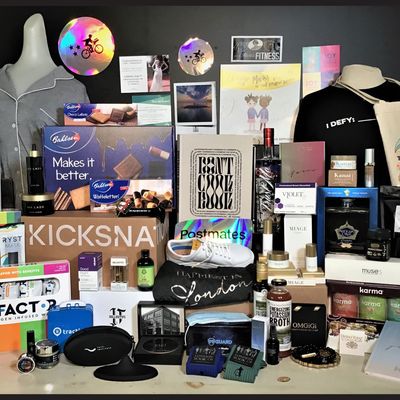
Last weekend’s Oscars left us all with a few gifts — Daniel Kaluuya’s homage to sex, Youn Yuh-jung being Youn Yuh-jung, and that clip of Glenn Close dancing to “Da Butt” — but some stars went home with literal presents. For the 19th year in a row, Distinctive Assets (a private company unaffiliated with the Academy) handed out “Everybody Wins” gift bags to losing nominees in major Academy Award categories. While celebrities often receive gifts at other awards shows, the Oscars bags tend to attract special attention for their sheer opulence. Forbes estimated that this year’s freebies — which include celebrity-trainer workout sessions, a liposuction procedure, a three-night retreat on a Swedish island, and a card for a commemorative gold NFT of Chadwick Boseman’s head — total $205,000 a bag. Brands pay thousands to donate their products and services, all for a chance at the exposure that a celebrity’s name can bring (and the public’s fascination with what expensive items are included each year). Though the Academy is no longer involved with the annual custom, that wasn’t always the case. In fact, up until 2006, the organization played a key role in the gift-giving on Hollywood’s biggest night.
Here’s the full history of the lavish gifting tradition, including a tax dispute with the IRS, a Bette Midler award loss, a lawsuit over trademark infringement, and a man known as the “Sultan of Swag.”
The Beginning
In 1989, Taylor Swift was born, George H.W. Bush was sworn in as the 41st president, and, according to Reuters, the Academy of Motion Picture Arts & Sciences was quietly beginning to give out thank-you gifts to the presenters and performers at its annual Oscars awards show. The practice continued for years, becoming increasingly competitive as brands (who were not charged a fee to donate) realized the power of celebrity exposure. One company told the LA Business Journal that having a gift certificate for spa services in the 2002 bag attracted an influx of high-profile customers, including Gwyneth Paltrow. For the 75th Academy Awards in 2003, ABC estimated the bags were worth $20,000 in merchandise. According to ABC, Best Supporting Actress nominee Queen Latifah shared her anticipation for the gifts with imdb.com ahead of that year’s ceremony. “I don’t care how much money you have,” she said, “free stuff is always a good thing.”
Eventually, the Academy transferred the responsibility of filling and securing the gifts to Sequoia Productions, the events company in charge of the Academy Awards Governors Ball. But the motion picture organization remained involved, Sequoia vice president Gary Levitt told the LA Business Journal in 2006. His team would narrow down hundreds of company requests submitted six months before the Oscars to a list of selections that Academy officials with final say would review. Finding out what the freebies were every year became an eagerly anticipated part of Academy Awards ramp-up coverage. According to the Business Journal, a donor that revealed their involvement before an agreed upon date would have their item removed from the basket.
The Crackdown
At the same time that excitement was growing for the gifts, criticism was also building. Actor Ed Norton told New York Magazine he found the practice of giving expensive gift bags at award shows “disgusting and shameful,” making celebrities look ridiculous and out of touch. By 2006, CNN Money reported that the value of the Oscars gift basket (which included hot items of the day, like a 60GB Apple iPod) had reached over $100,000, and the Internal Revenue Service finally took notice. “We expect the stars to pay their taxes just like the rest of us,” IRS commissioner Mark Everson said in a 2006 NPR interview, adding that the swag was a form of non-cash compensation — and thus taxable.
In a settlement with the IRS, the Academy agreed to pay some back-taxes for previous gifts and send that year’s recipients 1099 forms so they knew they would be expected to pay. “It’s time for us to move on,” then Academy president Sid Ganis told the New York Times, announcing that board members had voted to discontinue the practice, for reasons beyond just the tax issue. “Lately it has become this gigantic thing that has names attached to it, and implications to it, that don’t feel pleasant. And we’re surrounded by other venues that do it in a way that the press has noted as privileged and excessive. We try not to do that.”
That might seem like a pretty clear-cut ending to the story — no more gift bags from the Academy, no more Oscars gift bags. But private companies had actually been curating their own bundles on the sidelines for several years by then, and they, unlike the Academy, were willing to keep giving gifts that would be considered taxable income. Effectively, the Academy stepping out created a vacuum. And out of many contenders, one would rise as the most prominent.
The “Sultan of Swag”
Distinctive Assets was started by a man named Lash Fary in 1999 as a way to privately show clothes, jewelry, and accessories to the costume designers working behind the scenes on hit TV shows, according to LA’s The Place. A penchant for picking products that celebrities liked eventually led to an expansion into gift giving in general. In 2000, Fary’s company landed a gig creating the official gift bags for the 42nd annual Grammy Awards, at which Distinctive Assets also tested out a gift lounge — an entire room of free merchandise for presenters and performers to peruse.
Meanwhile, Fary’s reputation grew. Once known as an L.A. fashion adviser, he and Distinctive Assets were booked for the official lounges for multiple other prominent award shows. High-profile clients like the Tony Awards, People’s Choice Awards, and Latin Grammys chose him to provide their official gift bags. According to Forbes, the New York Times dubbed him the “Sultan of Swag.” Other outlets, like CNN in 2006, also ran with the nickname. Though he had peers and predecessors, Fary was a face often associated with the ushering in of an era of celebrity product placement.
His idea to break into gift-giving on Hollywood’s biggest night came from an unexpected source: Bette Midler, who THR reported once sent him a handwritten note thanking him for his kindness and “all the fab swag” he delivered to her during his second stint at the Grammys. He told the International Business Times that Midler inspired a new concept when she lost an award: a gift bag as a consolation prize. According to Bon Appétit, Distinctive Assets gave away its first unofficial “Everybody Wins” Oscars bags in 2003; the gifts went to the host and the losing nominees in major categories (Best Actor, Best Actress, Best Supporting Actor, Best Supporting Actress, and Best Director).
Predictably, Fary wasn’t happy about the IRS crackdown in 2006. According to Reuters, he published a statement in response on his company’s site, questioning why an entertainment figure should “more onerously” pay taxes on a gift than a corporate executive receiving a Christmas present. “Our celebrities should not be punished for their fame,” he reportedly wrote.
But it turned out that having to pay taxes for the gifts didn’t mean celebrities would stop accepting them (plus, they still had the option to refuse). And as the scale of Distinctive Assets bags escalated to include luxurious vacations and exclusive services, in addition to food, beauty, and fashion products, their profile rose. Fary’s bags were making headlines, just like the Academy’s bags had before. Unlike the Academy, however, Fary was charging brands to be included. According to a 2013 CPA Practice Advisor report, Distinctive Assets was charging companies a minimum of $4,000, and up to $20,000, for the privilege to donate their items. But brands were willing to shell out the money if it meant being part of the highly-reported-on bags and having the chance to reach a celebrity. The CPA report revealed that most of the top-tier items in the Oscars bags were never redeemed and that one year, Jessica Chastain was reportedly the only one to cash in on a $10,000 gift card for a home design consultation.
Still, getting products in front of stars was almost guaranteed; Fary told L.A. Weekly in 2014 that besides Sandra Oh, no celebrity had ever rejected a bag. (Side note: Fary has said the “bags” are normally actually a piece of luggage or a steamer trunk. Products can be delivered directly to a celeb’s house, hotel, or production company, which makes sense given the size of some past items, like mountain bikes).
The Academy vs. Fary
In 2016, the gift guru appeared to finally go too far. According to Forbes, Distinctive Assets’ bags were worth around $230,000 apiece that year — still the highest estimate Forbes has given to date. The “Everybody Wins” packages included what Vulture described as “the three V’s”: vapes, vibrators, and vampire breast lifts. That February, tired of the bad press from articles that suggested the bags were sponsored by or part of the Oscars, the Academy took Fary to court. The lawsuit argued that Fary was damaging the Academy’s reputation by leading people to believe the Academy was associated with products of “less-than-wholesome nature” and “the unseemliness of giving such high value gifts… to an elite group of celebrities” (that year, Forbes estimates placed the value of each bag at $230,000). Complaining of trademark infringement, false advertising, and trademark dilution, the Academy pointed to Distinctive Assets promotional materials that called the bundles “Everyone Wins At The Oscars®! Nominee Gift Bags” — yes, ® and all. The Academy wrote that it had previously asked Fary’s company to stop encouraging an association, but despite assurances that it would clean up its act, “Distinctive Assets is now at it again.”
A month later, Distinctive Assets released a statement saying they had reached an “amicable” settlement with the Academy. The company agreed to no longer use any Academy trademarks and to start including disclaimers in its materials that reminded the press it was not associated with the Academy in any way. In turn, Fary’s company would continue to give away bags and “accurately state that its gift bags are given to Oscar nominees.” The legal spat caused Fary to tone down the extravagance slightly — according to Forbes, Distinctive Assets declined to disclose both the prices of products and the overall value of the bag the following year, but news outlets continued to estimate the costs as they continued to balloon.
What’s Been in the Bag?
Over the years, the “Everybody Wins” bags have reflected current events multiple times. In 2016, the bag’s inclusion of a $55,000 trip to Israel, partly paid for by the Israeli government, prompted public backlash. Reuters reported that the U.S. Campaign to End the Israeli Occupation and Jewish Voice for Peace ran a joint, full-page ad in the Los Angeles Times asking Oscar nominees to “#SkipTheTrip.” Meanwhile, in 2019, Fary told Forbes that several CBD products were in that year’s gift bag as a nod to the recent legalization of recreational marijuana sales in California.
For 2021, Fary said in a Fortune interview, Distinctive Assets wanted the bags to feel like they had a bigger purpose, beyond being an assortment of freebies. He told the magazine that the products this year came from female-owned businesses, Black-owned businesses, disabled entrepreneurs, and companies who give back. An anti-racist children’s book was also reportedly included. Perhaps most controversially, a golden NFT tribute to the late Chadwick Boseman (posthumously nominated for Best Actor) made its way in. The card showing his head dipped in gold signified an auction of the rights to the digital artwork, with half of the funds going to colon cancer foundations, according to CNET (after complaints that Boseman’s death was being commodified, the artist announced plans to redesign the image). And of course, in a truly pandemic-era move, all gift bags were reportedly delivered via Postmates.


